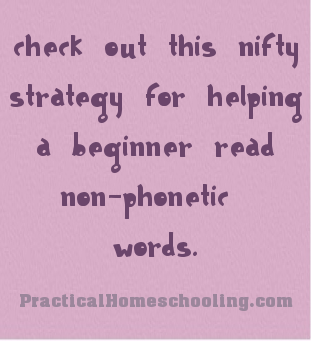Spring Your Child from the "Sight Word" Trap!
By Mary Pecci
Printed in Practical Homeschooling #76, 2007.
 Mary Pecci has a nifty strategy for helping a beginner read non-phonetic words.
Mary Pecci has a nifty strategy for helping a beginner read non-phonetic words.

|
 |
 What is the Sight Word Trap? Most of you home schooling parents know only too well what the Sight Word Trap is. Just when your child is decoding words on the fly, in start coming those unavoidable Sight Words - words that can't be decoded phonetically and, therefore, must be memorized "whole."
What is the Sight Word Trap? Most of you home schooling parents know only too well what the Sight Word Trap is. Just when your child is decoding words on the fly, in start coming those unavoidable Sight Words - words that can't be decoded phonetically and, therefore, must be memorized "whole."
This doesn't present much of a problem at first. But as the number of Sight Words continually increases, many children get caught in the dilemma: "Is this a Sound word or a Sight word?"
This causes hesitation and confusion - especially for those children who have great difficulty retaining the Sight Words. As a result, learning to read becomes a painful experience - and on comes that power struggle.
Yet, there is an easy way to avoid the Sight Word Trap... and it's fun, too.
It must be noted that inconsistent vowels create most of the Sight Words. For example, note these exceptions to the "two-vowel-together" rule for ai, as in main: plaid, said, aisle, captain.
However, rather than requiring your child to "memorize" these exceptions as Sight Words, you can play a fun detective game with your child called "What's the Clue?"
Here's how it works:
First, tell your child the Sight Word. Then explain that when you ask, "What's the Clue?" your child is to sound and simultaneously underline from left to right the sounds in the Sight Word that he or she can hear. Ignore all other letters, as shown in the following examples:
PARENT: This word is plaid, as in "This jacket is plaid." What's the clue?
CHILD: p l a i d
PARENT: This word is said, as in "I heard every word you said." What's the clue?
CHILD: s a i d
PARENT: This word is aisle, as in "Please walk down this aisle." What's the clue?
CHILD: a i s l e
PARENT: This word is captain, as in "He is the captain of the ship." What's the clue?
CHILD: c a p t a i n
Although your child may be hesitant at first, he will quickly pick up speed with practice. You will find that these relevant, left-to-right phonics clues are powerful in assisting children with retention and fluency with these Sight Words. Give your child a special detective name, such as "Secret Agent" or "Private Eye" to spark interest and introduce every Sight Word this way with "What's the Clue?"
Children, no less than adults, can't resist a good detective game. Consider how easily contestants on the popular TV game, "Wheel of Fortune," are able to solve a word puzzle with minimum letter clues. You will be amazed at children's ability to sleuth out the left-to-right phonics clues within Sight Words and you will share in the burst of excitement they exhibit while reading when they come across a Sight Word they can easily sleuth out.
Now, test yourself. Let's play "What's the Clue?"
Following are 20 sample Sight Words. Using your super-sleuth skills, go through each word and underline the left-to-right phonics clues. Just ignore all other letters. Then check your responses with the answers at the end of this article.
| have |
are |
tongue |
give |
| the |
would |
come |
friend |
| where |
though |
gone |
warm |
| listen |
you |
enough |
sign |
| double |
learn |
what |
guess |
Remember that children also have the "context" of a story to boost their fluency with Sight Words, while these left-to-right phonics clues will lift them up over the top.
By approaching Sight Words with "What's the Clue?," you can transform a threat to your child's reading ability into a fun detective game and free yourself to experience the joy of teaching.
For you trivia fans, here's a question from The Guinness Book of Records:
What are the Most Common Words in Written English - the 12 most frequently used words?
Answer: In order, the Most Common Words are: the, of, and, to, a, in, that, is, I, it, for, and as.
Access your super-sleuth ability and decide which ones are Sight Words and how you're going to introduce them with "What's the Clue?" Continue to play the "What's the Clue?" detective game with your child for every Sight Word that crosses your child's reading path. And voila! You will spring your child from the Sight Word Trap!
Clues Check
| h a v e |
a r e |
t o n g u e |
g i v e |
| th e |
w o u l d |
c o m e |
fr i e n d |
| wh e r e |
th o u g h |
g o n e |
w a r m |
| l i s t e n |
y o u |
e n o u g h |
s i g n |
| d o u b l e |
l e a r n |
wh a t |
g u e ss |